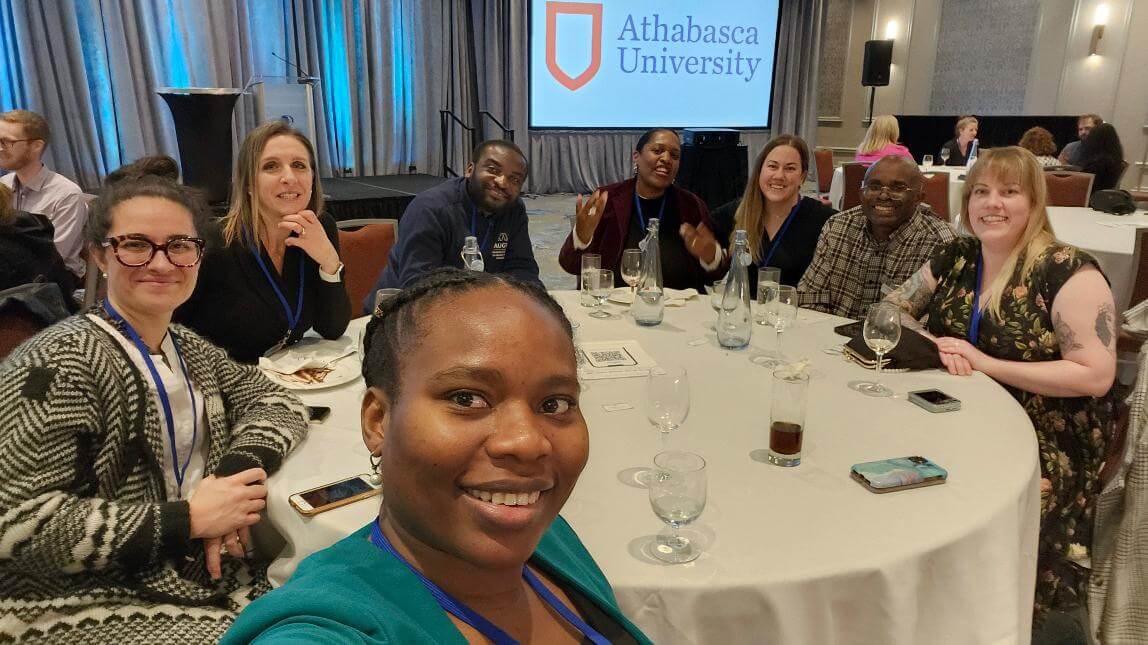First-ever hybrid research conference sets attendance record
Athabasca University's 2024 Graduate Student Research Conference (GSRC) was an event like no other, fostering community and advancing knowledge to make the world a better place.
For the first time in its 13-year history, the three-day conference was held in a hybrid format. More than 110 people attended in person or online from Oct. 25 to 27, from across Canada and around the world, taking in over 40 graduate and undergraduate student research presentations.
This year's conference theme, "Research with Impact," called for research that not only advances knowledge in academia, but also makes the world a better place to live. The event allowed students to gain experience presenting their findings in public and connect with peers and fellow researchers.
Research abstracts focused on addressing social, economic, diplomatic, and environmental problems that threaten our collective well-being.
"The Graduate Student Research Conference is very special to me personally and for AU as an institution. Our students are the reason we have a vibrant and productive research university. Students bring new perspectives, visions, and approaches to research problems," said Dr. Shawn Fraser, dean of the Faculty of Graduate Studies.

Congratulations to conference abstract winners
First place: Sarah Borsa, Master of Nursing
"Registered Psychiatric Nurses in British Columbia: Career Intentions and Work Environment."
Second place: Josh Flis, Bachelor of Arts, Psychology Major
"Evaluation of the Alliance Against Violence and Adversity (AVA) Online Training Program: Addressing Gender Violence (GBV) and Adverse Childhood Experiences (ACEs) through Academic-Community Collaboration and Training."
Third place: David Boyle, Doctor of Business Administration
"Measuring and Using the Hofstede Dimension Scores of Inuit (Nunavut) Culture."
People's Choice Award: Justin Brokop, Master of Counselling
"Reframing ADHD: Challenging Stigma Through a Strength-Based Approach."
Giving a voice to registered psychiatric nurses
Master of Nursing student Sarah Borsa's research, a mixed-method study, examined British Columbia's registered psychiatric nurses' perceptions of their work environments, their intent to leave, and strategies they reported as valuable to remain in their jobs.
Borsa's research was inspired by her experiences as an emergency nurse during the pandemic, when she witnessed a decline in nurses' mental health. This decline contributed to a staffing crisis, that's ongoing, and highlighted an urgent need for solutions to support health-care workers' well-being.
Borsa, now a full-time faculty member at Douglas College, said her goal with the research was to give a voice to registered psychiatric nurses in B.C. and highlight the importance of improving supports to help retain nurses.
Raising awareness of gender-based violence
Josh Flis's research was also motivated by real-life experiences. His mother and grandmothers were affected by gender-based violence. The effects of their experiences influenced Flis's research interests. "I have always been inspired to find upstream solutions for systemic problems," said Flis, a Bachelor of Arts, Psychology Major student
"This is why I was drawn to working with Dr. Kharah Ross and Alliance Against Violence and Adversity, to help reconcile the gaps between academic research and real-world applications in addressing these issues."
Flis's research, in collaboration with Ross, an associate professor in the Faculty of Humanities and Social Sciences, deals with the implementation science to evaluate the AVA online training program.
The program offers academics and community partners the opportunity to learn about gender-based violence through a holistic lens curated through community and academic partnerships.
Reflections on a successful research conference
"I strongly encourage any student conducting research, a literature review, or proposal to present at this conference. It provides valuable experience in presenting and offers an opportunity to learn from others. The supportive and inspiring environment fosters confidence and personal growth," said Borsa.
"This was my first ever experience competing in academia. I've always been competitive, GSRC gave me a thrill that was missing in my life. This conference showed me that I can bring something to the table that others can't," said Flis.
A university Like No Other
Athabasca University is a university like no other, uniquely focused on the core priorities of access, community, and opportunity.